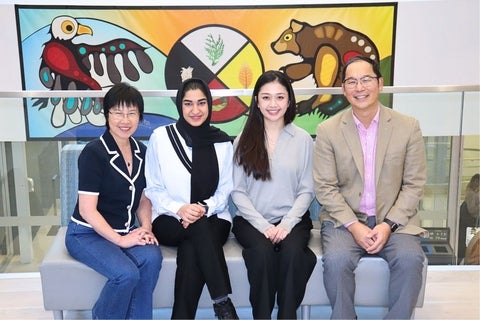University of Waterloo working with Southern Chiefs’ Organization and Manitoba Association of Optometrists to co-develop data governance policies for eye data

University of Waterloo eye data governance team members Dr. Helen Chen, Memoona Maah, Gina Najiman and Dr. Stanley Woo
People have the right to a say in how their data is collected, managed, stored and used. That’s the principle behind a new partnership that will see the University of Waterloo co-develop governance policies for eye data with a Manitoba First Nations organization.
Thanks to funding from the Digital Research Alliance of Canada’s DRI EDIA Champions pilot program, a Master of Health Informatics student, Memoona Maah, is now co-leading the development of data governance policies with the Southern Chiefs' Organization (SCO), which represents 33 Anishinaabe and Dakota Nations and more than 88,000 citizens in what is now southern Manitoba.
“First Nations face multiple barriers in accessing health care, including vision care,” said Maah, a second-year master’s student. “One of these barriers is that existing systems may not prioritize First Nation ownership and control over their health data. That’s what we’d like to tackle, with First Nation people at the table right from the start.”
“Our citizens have a right to their data and how it is collected and used. We must have greater say in developing policies which govern health data collection,” stated Acting Grand Chief Cornell McLean of the Southern Chiefs’ Organization. “We know data will support our health transformation journey as we reclaim our inherent right to health and work to close the 11-year gap in life expectancy between First Nation citizens and all other Manitobans. Our voices must be included from the very beginning.”
Data governance policies will be developed according to local priorities and resolutions in addition to the incorporation of internationally recognized principles: FAIR (Findable, Accessible, Interoperable and Reusable), CARE (Collective Benefit, Authority to Control, Responsibility and Ethics) and OCAP (Ownership, Control, Access and Possession). These principles are intended to ensure data is ethically managed and beneficial to all stakeholders. They also emphasize the rights of Indigenous communities over their data and how their data is shared.
The co-design of the data governance policies will be done through a series of workshops, both virtual and in person in Manitoba. Participants will include community engagement led by SCO Health Transformation, researchers and members of the Manitoba Association of Optometrists (MAO), which is working to improve access to eye care in First Nations.
“Our association is dedicated to ensuring that patients can trust us to manage their data safely and in a way that is comfortable for them,” said Dr. Averi Van Dam, president of the MAO. “We are hopeful these workshops will help us learn this better and that steps like this can ultimately help lead to better eye care for all Manitobans.”
The data governance development will consider the role of artificial intelligence in areas such as facilitating data collection using AI scribes, ensuring data quality and consistency, and analyzing data for research purposes.
“The mantra from First Nations is, ‘Nothing about us without us,’” said Dr. Helen Chen, director of the Professional Practice Centre for Health Systems and professor of practice with the School of Public Health Sciences and the Cheriton School of Computer Science. “Regardless of what tools are used, we have to consider how to manifest that principle in any data collection, storage, transmission and sharing, including implementing all the necessary security and privacy protection measures.”
With co-developed data governance policies, planned eye data research by an interdisciplinary group of University of Waterloo researchers will be built on equitable, ethical and culturally safe foundations, said Dr. Stanley Woo, director of the School of Optometry and Vision Science.
“We’re delighted to part of this unique partnership between the University of Waterloo, the Southern Chiefs’ Organization, the Digital Research Alliance of Canada and the Manitoba Association of Optometrists to co-design research in eye care,” said Woo. “It’s a great example of how researchers can collaborate in respectful ways with First Nations to do important work.”